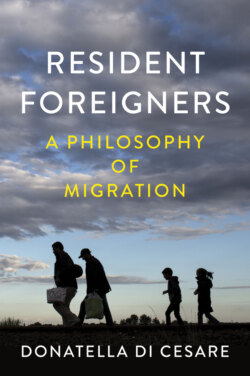Resident Foreigners

Реклама. ООО «ЛитРес», ИНН: 7719571260.
Оглавление
Donatella Di Cesare. Resident Foreigners
Contents
Guide
Pages
Resident Foreigners. A Philosophy of Migration
Copyright page
Dedication
Introduction: In Short
1 MIGRANTS AND THE STATE
1 Ellis Island
2 When the migrant unmasks the state
3 The state-centric order
4 A fundamental hostility
5 Beyond sovereignty: a marginal note
6 Philosophy and migration
7 A shipwreck with an audience: on today’s debate
8 Thinking from the shore
9 Migration and modernity
10 Columbus and the image of the globe
11 ‘We refugees’: the scum of the Earth
12 What rights for the stateless?
13 The frontier of democracy
14 The sovereigntism of closed borders
15 Philosophers against Samaritans
16 The primacy of citizens and the dogma of self-determination
17 If the state were a club: liberalism based on exclusion
18 The defence of national integrity
19 Owning the land: a baseless myth
20 Freedom of movement and birthright privileges
21 Migrants against the poor? Welfare chauvinism and global justice
22 Neither exodus, nor ‘deportation’, nor ‘human trafficking’
23 Ius migrandi: for the right to migrate
24 Mare liberum and the sovereign’s word
25 Kant, the right to visit and residency denied
Notes
2 THE END OF HOSPITALITY?
1 The continent of migrants
2 ‘Us’ and ‘them’: the grammar of hatred
3 Europe 2015
4 Hegel, the Mediterranean and the cemetery of the sea
5 Fadoul’s story
6 ‘Refugees’ and ‘migrants’: impossible classifications
7 The metamorphoses of the exile
8 Asylum: from ambiguous right to a dispositif of power
9 ‘You’re not from here’: an existential negation
10 The migrant’s original sin
11 ‘Illegals’: being condemned to invisibility
12 The terms of domination: ‘integration’ and ‘naturalization’
13 When the immigrant remains an émigré
14 The foreigner who lives outside, the foreigner who lives within
15 Clandestine passages, heterotopias, anarchic routes
Notes
3 RESIDENT FOREIGNERS
1 On exile
2 Neither rootlessness nor roaming without direction
3 Phenomenology of habitation
4 What does it mean to migrate?
5 The global uprooting
6 ‘The earth-born’: Athens and the myth of autochthony
7 Rome: the city without origin and imperial citizenship
8 The theological–political charter of the ger
9 Jerusalem, the City of foreigners
10 On return
Notes
4 LIVING TOGETHER IN THE NEW MILLENNIUM
1 The new age of walls
2 Lampedusa: of what border is it the name?
3 Condemned to immobility
4 The world of the camps
5 The passport: a paradoxical document
6 ‘To each their own home!’ Crypto-racism and the new Hitlerism
7 Hospitality: in the impasse between ethics and politics
8 Beyond citizenship
9 The limits of cosmopolitanism
10 Community, immunity, welcome
11 When Europe drowned …
12 The power of place
13 What does cohabiting mean?
14 Resident foreigners
Notes
POLITY END USER LICENSE AGREEMENT
Отрывок из книги
Donatella Di Cesare
Translated by David Broder
.....
Looking back at our own time, future history books will not simply indulge today’s hegemonic narrative. They will have to say that Europe – the homeland of human rights – denied hospitality to people who were fleeing war, persecution, abuse and rape, desolation and hunger. The potential guest was instead stigmatized a priori as an enemy. In the pages of these future history books, those who were safe and protected by state borders will bear the burden and the responsibility for the lives – and deaths – caught up in this history.
As well as the land, the sea has an important place in these pages. It is an in-between space that both unites and separates. It is a passageway that steers clear of borders, erases any trace of appropriation, and preserves the memory of another clandestinity – the clandestinity of opposition, resistance and struggles. This is clandestinity not as a stigma – ‘the illegals’ – but rather as a choice. The sea route points to the overturning of order, to the challenge of the elsewhere and the other.
.....